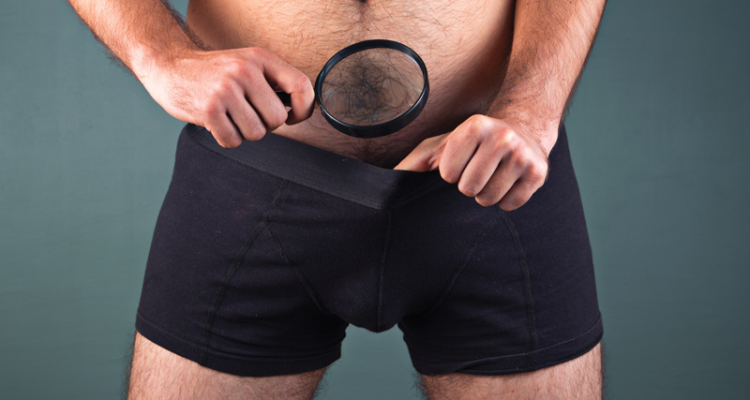Growing a mustache isn’t enough, dudes. Here’s the low down on Men’s Health.
Guys, listen up: Your nether region needs your attention. We know going to the doctor to, ahem, bend over and cough doesn’t sound like fun, but doing it can save your life. If you’re a skeptic who’d rather keep his hands to himself, we’ve brought in two men’s health Clermont-based doctors to convince you to give more love to your boys.
Dr. Jamin V. Brahmbhatt and Dr. Sijo J. Parekattil recently tied up a men’s health awareness campaign that stretched from Florida to New York. They drove a swanky Tesla and stooped to give health talks along the way, ultimately reaching 300,000 men directly or through social media. The two have plans to extend the “Drive 4 Men’s Health” next year, with the lofty goal of reaching a million people. Here they talk to FN about hot topics in men’s health, like who is at risk and how athletes can keep their undercarriage in tip-top condition.
FN: I think all our male readers want to know—what are the biggest health issues they should be worrying about?
DR. Parekattil – The biggest issue that stands out is that men just don’t really like to take care of themselves and are twice less likely to go in and see a doctor than their female partners. There’s a huge disconnect.
DR. Brahmbhatt – Men between the ages of 13 and 35 really have no reason to go to the doctor. Women are going to the gynecologist. Men don’t really have that reason to go. Then, after 40, they start having medical problems and start going to the doctor.
FN: I read that testicular cancer is a young man’s disease—the most common cancer in young men. Are there preventative measures to reduce the risk of developing this kind of cancer? How treatable is testicular cancer?
DR. Brahmbhatt –– Yes, it’s the most common cancer in men between the ages of 15 and 35. Almost 9,000 men will be diagnosed with testicular cancer and about 400 will die this year. The interesting thing is testicular cancer can be very easily diagnosed and the cure rates are really high. Most men ignore the symptoms. Just like women should do breast exams, men should do an exam once a month to see if there are any changes in size or discrepancy in testicles.
DR. Parekattil – We need to promote it more. Men are not comfortable getting genital urinary exams and even some physicians also have a bias about going there— it’s like hear no evil, see no evil. We need to get patients to be their own best advocates. Ask your doctor how to do a testicular exam. Get used to what your testicles feel like. We suggest doing it in the shower; just feel for any discrepancies between both sides and if there’s a hard, painless mass in the testicle. Things that are painful are more benign and more inflammatory. Things that are painless can mean cancer.
FN: Our readers are athletes, so what sports or exercises pose potential health risks to men? Is there anything that can be done to reduce the risks?
DR. Parekattil – We do see a lot of professional cyclists. They can cause chronic trauma to the perineal area—the area between the scrotum and the anus. So there’s a lot of nerves and muscles there and the urethra travels in that area. Chronic micro-trauma can cause what we label “chronic pelvic pain.” Recently there have been designs that diffuse the pressure onto the gluteal area. You want to increase the surface area so there’s not as much pressure. That seems to have made a difference.
DR. Brahmbhatt – The problem with CrossFit is those extreme clean and jerks aren’t the best for our bodies. If they feel a bulge or pain they have to come and get checked out. A lot of these athletes should be assessed yearly for risk of hernia. Straining can put them at excess risk, and if they wind up having a procedure for hernia it can affect their overall conditioning. And, if you do have trauma to the testicle, it can affect reproductive health later.
FN: Is there a way to tell that you have a predisposition to hernia?
DR. Parekattil – It’s hard to know beforehand. There are some fancy MRIs, but the best thing is really prevention, like wearing sports briefs. You can get them at any sporting goods store; it gives a little extra support for the testicle and groin area. As most athletes know, the form and structure to how the lifting is done is important. It’s always wise to work with professional trainer or physical therapist, obviously the technique and posture and stability of how it’s done is very critical.
FN: What about supplementation? What should men know before taking supplements?
DR. Parekattil – Some supplements, even though they may be natural or fairly safe from a vitamin standpoint, have properties that mimic testosterone. So the body gets fooled and the body thinks you’re making too much—so the body will shut down the testicles because the body auto-regulates. That can cause decreased sperm production and decreased testosterone production and you become more and more dependent on external supplements. It can also cause atrophy, scarring or increase in the size of the testicle. It can cause permanent scarring or shrinking of testicle too. You should minimize self-medication; work with a primary care physician before you go and get supplements online. The problem is the FDA doesn’t regulate vitamin supplements.
There’s also a downstream effect, when people who use supplements that increase testosterone, want to have children. It’s always best for these men to work with a male fertility specialist. We offer cryo-preservation as a backup, so 5, 10, 20 years down the road so they have that option, in case there’s some irreversible damage they have a back up. Sperm banking may be something they want to think about.
FN: A lot of your advice is things like: Get better sleep, quit smoking, be more active, eat healthy and reduce stress. That all seems very general; how do those broad suggestions help testicular health, specifically?
DR. Brahmbhatt – Men on average have a five year lower life expectancy than women. One in two men are at risk of getting cancer in their lives. The statistics are out there but men choose to ignore it; prevention has never been important to men. We’re trying to get men to think of their bodies as cars: If you do the maintenance every 3,000 miles, it’s going to last 100,000 miles. If you ignore your car, you’re not going to get the full mileage. But it’s not like a car. You can buy a new car. You can’t buy a new heart or lung or testicle.
DR. Parekattil – An example of this is how recently there were guidelines released that suggested that breast cancer screening wasn’t necessary. From a financial standpoint, it didn’t make sense to screen everyone. But from a humanistic stance, it makes sense. Women banded together to protest that. For men there’s a PSA blood test and rectal exam that was recommended for guys after 50, but recent guidelines suggested that it wasn’t beneficial. However, in this case we didn’t get a bunch of guys banding together to get their rectal exams! Most were relieved: “phew! No rectal exam!” About 30,000 guys die from prostate cancer a year; 230,000 will be diagnosed with prostate cancer this year alone. From that standpoint, we can make a big difference. We want to get guys to take ownership of their health. If it takes cool cars and technology to draw them in, then that’s okay.
FN: What advice do you have for guys who have a problem talking about some of the more sensitive men’s health subjects with their doctor; things like erectile dysfunction or how to do a testicular self-exam?
DR. Parekattil – The key thing is hooking up with someone they feel comfortable talking to. It’s like the old saying the squeaky wheel gets the oil. At the end of the day it’s the responsibility of the patient to care. It’s our responsibility as physicians to educate them on what to advocate for.
DR. Brahmbhatt – You should know your own body and your family history, anything that puts you at high risk for diseases.

